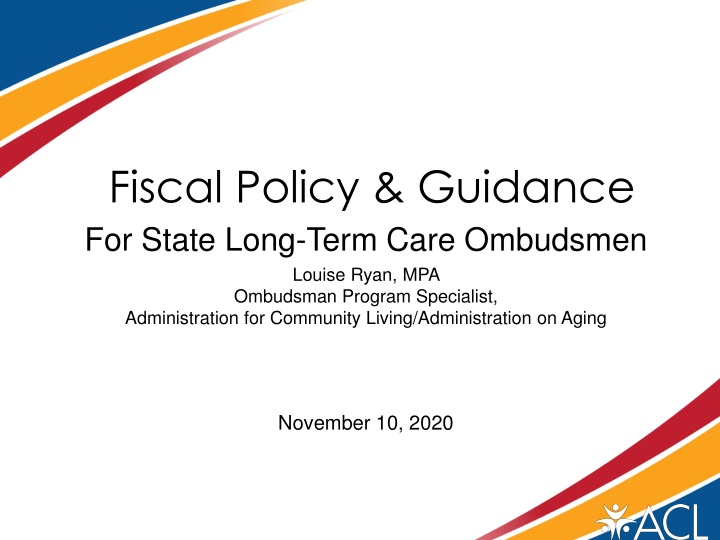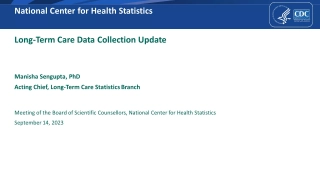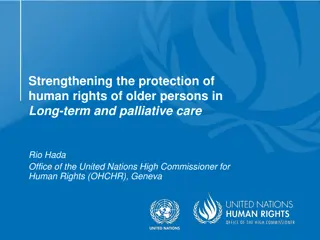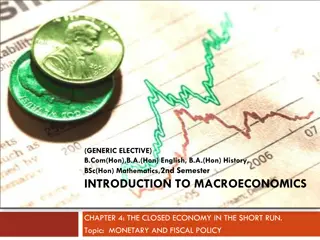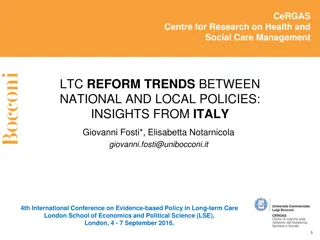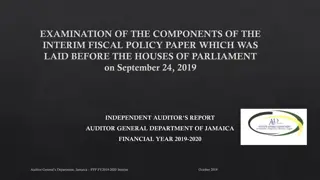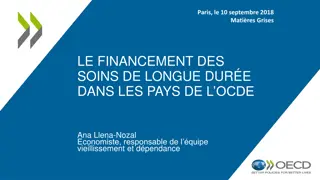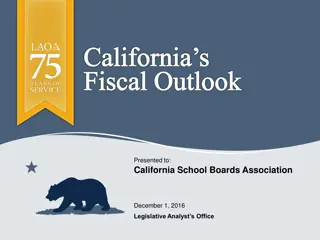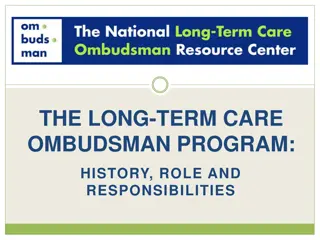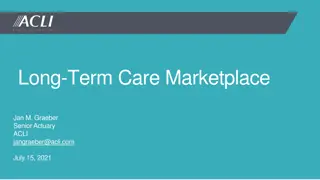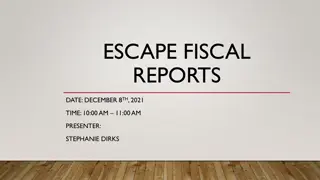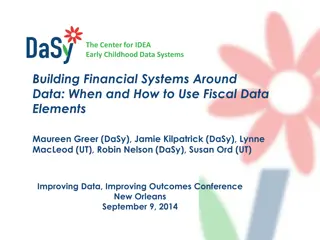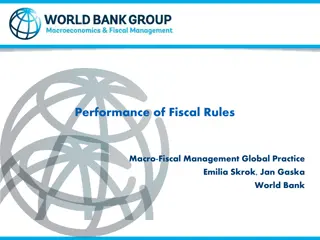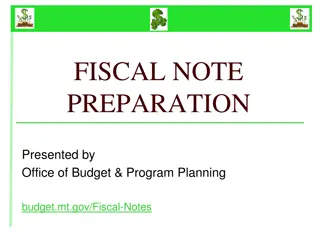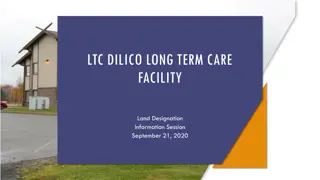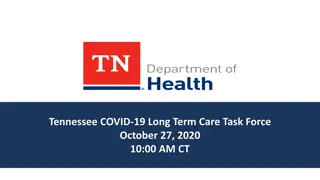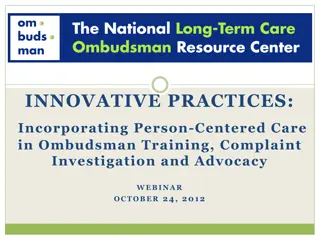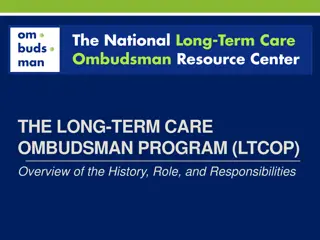Fiscal Policy Guidance for State Long-Term Care Ombudsmen
Overview of the fiscal management responsibilities for State Long-Term Care Ombudsmen under the Older Americans Act requirements. Covers topics such as fiscal management, funding allocations, state plan requirements, and fiscal responsibilities. Details the OAA and LTCOP rule provisions related to fiscal management, including determining fiscal resources, program budgets, and expenditures.
Download Presentation

Please find below an Image/Link to download the presentation.
The content on the website is provided AS IS for your information and personal use only. It may not be sold, licensed, or shared on other websites without obtaining consent from the author.If you encounter any issues during the download, it is possible that the publisher has removed the file from their server.
You are allowed to download the files provided on this website for personal or commercial use, subject to the condition that they are used lawfully. All files are the property of their respective owners.
The content on the website is provided AS IS for your information and personal use only. It may not be sold, licensed, or shared on other websites without obtaining consent from the author.
E N D
Presentation Transcript
Fiscal Policy & Guidance For State Long-Term Care Ombudsmen Louise Ryan, MPA Ombudsman Program Specialist, Administration for Community Living/Administration on Aging November 10, 2020
Overview OAA and LTCOP Rule-Fiscal Management Older Americans Act Requirements of states Older Americans Act (OAA) Allocations Minimum funding and State Plan Requirements 2
Fiscal Management What does it mean? How does it work? Develop or participate in budget Decision maker with how State Office resources are spent Involved in local allocations Local programs share their budgets for your review On-going monitoring of state and local level spending 3
Fiscal Responsibilities Background: The state Ombudsman has three distinct responsibilities with regards to fiscal management of the Ombudsman program. The Ombudsman regulation 45 CFR 1324.13 (f) Fiscal management. (paraphrased) requires the Ombudsman to determine the use of the fiscal resources. To report funds expended data in accordance with the National Ombudsman Reporting System (NORS). To review and certify that the program met Minimum Funding Requirements, in accordance with the Older Americans Act by submitting the Certification of Long-Term Care Ombudsman Program Expenditures form (see page 29 for information on the form).
OAA and LTCOP Rule Provisions OAA Specific to State LTCO Section 712(a)(2)-The Ombudsman shall be responsible for the management, including the fiscal management, of the Office. LTCOP Rule at 1324.11(e)(vi) (vi) Procedures that clarify appropriate fiscal responsibilities of the local Ombudsman entity, including but not limited to clarifications regarding access to programmatic fiscal information by appropriate representatives of the Office. 5
LTCOP Rule at 1324.13 (Functions & Responsibilities) (f) Fiscal management. The Ombudsman shall determine the use of the fiscal resources appropriated or otherwise available for the operation of the Office. Where local Ombudsman entities are designated, the Ombudsman shall approve the allocations of Federal and State funds provided to such entities, subject to applicable Federal and State laws and policies. The Ombudsman shall determine that program budgets and expenditures of the Office and local Ombudsman entities are consistent with laws, policies and procedures governing the Ombudsman program. 6
Timing of Fiscal Responsibilities A potential fiscal management routine could include: MONTHLY - QUARTERLY Reviewing budgets and financial statements: New SLTCO meet with fiscal staff as soon as possible to begin learning about the program budget and establish a meeting schedule. Experienced SLTCO meet routinely with fiscal staff, such as monthly or at least quarterly. 7
Timing of Fiscal Responsibilities You may need to coordinate among several staff, for instance, if your program is contracted out you may have routine meetings with your agency s fiscal staff and regular communication with your State Unit on Aging s fiscal staff. Consider establishing routine times to meet with both. If you have local Ombudsman entities develop a procedure to conduct routine reviews of their initial budget and invoices or fiscal reports. 8
Timing of Fiscal Responsibilities NOVEMBER Set an appointment to review NORS Table 3, Part F with fiscal staff. DECEMBER Work through a rough draft of funds expended with fiscal staff. JANUARY Report final funds expended. JULY - AUGUST Certification of Long-Term Care Ombudsman Program Expenditures ACL typically sends the Certification of Long-Term Care Ombudsman Program Expenditures in July. Use your NORS report and other fiscal data to review the form and sign if you agree that the expenditures met or exceeded the required minimum funding. If you have any questions or concerns, contact ACL. 9
Older Americans Act Allocations Where does the funding authorization come from? Ombudsman programs are federally funded under Titles III and VII of the Older American s Act. TITLE III: Grants for State and Community Programs on Aging Title VII: Vulnerable Elder Rights Activities- Chapter II Ombudsman Chapter III Elder Abuse 10
OAA- Title III USES OF FUNDS Authorization for States to use Title-III funds: Section 304 (d)(1): From any state s allotment, after the application of section 308(b), under this section for any fiscal year... (B) such amount (excluding any amount attributable to funds appropriated under section 303(a)(3)) as the State agency determines to be adequate for conducting an effective Ombudsman program under section 307(a)(9) shall be available for conducting such program. 11
Fiscal Guidance: Title III funds Title III funds utilized by the State under Section 304(d)(1)(B) must be used to support activities of the Ombudsman Program, as defined in Section 712 of the Act, at either the State level or at the local level for statewide program development. These funds are not subject to the intrastate funding formula. 12
Fiscal Guidance: Title VII All of the Title VII Ombudsman Funds must be used on direct costs of the Ombudsman Program this can include staff, office space, training costs, etc. Title VII funds do not require a match. However, States are not precluded from requesting a match to Title VII funds which they award by grant or contract to another agency or organization. 13
Fiscal Guidance: Allowable Uses of Title VII, Chapter 3 Funds States may use any portion of their Title VII, Chapter 3 abuse prevention allotment to fund specific, identifiable activities conducted by any public or private non-profit program or agency, including adult protective services and ombudsman programs, which directly correspond to the abuse prevention activities outlined in Section 721(b) of the Act. 14
What does the OAA require of States? State Minimum Funding Sec. 307 (State Plans)(a)(9): States must expend on their statewide Ombudsman Programs no less than they expended in Title III-B and Title VII funds for FY 2019. Non-Supplant Section 705(a)(4): States may not use Ombudsman Title VII funding to supplant, replace, or in substitution for any other Federal or State Funding. 15
Minimum Funding Confusion Minimum funding is not a maintenance of effort requirement is not required from all sources but from funds received (by the state agency) under this title Meaning if additional amounts of funds were expended from other sources, such as state general funds, the state does not have to maintain that amount beyond what is in Title VII and Title III 16
Area Agency Minimum Funding Section 306 (Area Plans) (a)(9): Each AAA must expend on activities of the Ombudsman Program not less than the amount of Title III funds expended by the AAA in FY 2019. 17
Non-Supplant Title VII Non-Supplant, Section 705(a)(4): (a) ELIGIBILITY - In order to be eligible to receive an allotment under this subtitle, a State shall include in the State plan submitted under section 307 an assurance that the State will use funds made available under this subtitle in addition to, and will not supplant, any funds that are expended under any Federal or State law in existence on the day before the date of enactment of this subtitle, to carry out each of the vulnerable elder rights protections activities described in this chapter. 18
Fiscal Guidance: Title VII-Prohibitions Use of Title VII funding for involuntary services to, or coerced participation in, Title VII-funded programs by alleged victims, abusers or their households, is strictly prohibited. Use of any of the Title VII ombudsman allotment to fund activities which are not authorized under Section 712 of the Act and conducted by the Ombudsman Program or a grantee or contractor of the Ombudsman Program is prohibited. 19
Fiscal Guidance: Title VII-Other The intrastate funding formula does not apply to Title VII funds. States may not include any Title VII funding in their calculation of funds available for State plan administration. Title VII funds should not and may not be included in the base amount used to calculate the ten percent limitation on the use of funds for area plan administration under the provisions of Section 304(d)(1)(A). 20
Questions? Reminder: This is complicated stuff but keep in mind the basic principles: Minimum funding at 2000 level Can t supplant Title VII, Chapter II Title VII, Chapter II must be spent on OLTCOP States have flexibility with Title IIIB You need to certify your expenditures with your State Unit every Summer Call if you have Questions! 21
Questions or comments? How to find the Rule: https://www.ecfr.gov/cgi- bin/retrieveECFR?gp=&SID=5b7abe6b970a70ccdbff264ab58dcad2&m c=true&n=sp45.4.1324.a&r=SUBPART&ty=HTML#se45.4.1324_11 Title VII Fiscal Guidance -( PI)-94-02 https://www.acl.gov/node/648 Louise Ryan E-mail louise.ryan@acl.hhs.gov (202) 795-7355 22
